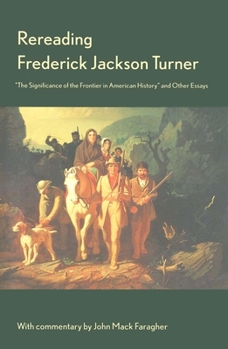Rereading Frederick Jackson Turner: The Significance of the Frontier in American History and Other Essays
Select Format
Select Condition 
Book Overview
"The best assembly of Turner's essays now available. Faragher's introductory and concluding commentaries add considerably to the import of the book."--Stephen Aron, University of California, Los Angeles "Still ranks as the most influential piece of writing on American history."--Carlin Romano, Philadelphia Inquirer, A Notable Book of 1994 "Faragher's invaluable afterword . . . provides a judicious introduction...
Format:Paperback
Language:English
ISBN:0300075936
ISBN13:9780300075939
Release Date:February 1999
Publisher:Yale University Press
Length:276 Pages
Weight:0.60 lbs.
Dimensions:0.8" x 5.5" x 8.5"
Customer Reviews
1 rating
Turner's "Frontier Thesis" Unfiltered
Published by Thriftbooks.com User , 18 years ago
This is a very useful collection of ten essays by University of Wisconsin/Harvard University historian Frederick Jackson Turner written through out his career. Edited and introduced by John Mack Faragher, this book is a very fine entrée point to the thought of Turner. The first of the essays published here is Turner's seminal work, "The Significance of the Frontier in American History," an essay that defined a whole field of research. Read at the 1893 annual meeting of the American Historical Association in Chicago, this paper has exerted an enormously powerful force on the historiography of the United States, in no small measure because of its powerful statement of American exceptionalism. Turner took as his cue an observation in the 1890 U.S. census that the American frontier had for the first time closed. He noted, "Up to our own day American history has been in a large degree the history of the colonization of the Great West. The existence of an area of free land, its continuous recession, and the advance of American settlement westward explain American development." Turner insisted that the frontier made Americans American, gave the nation its democratic character, and ensured the virtues of self-reliance, community, egalitarianism, and the promise of justice. He noted that cheap or even free land provided a "safety valve" that protected the nation against uprisings of the poverty-stricken and malcontented. The frontier also produced a people with "coarseness and strength...acuteness and inquisitiveness, that practical and inventive turn of mind...[full of] restless and nervous energy...that buoyancy and exuberance which comes with freedom." It gave the people of the United States, in essence, virtually every positive quality they have ever possessed. Despite criticisms, through at least the 1950s vision of the frontier reigned supreme as an underlying definer of American character. It conjured up an image of self-reliant Americans moving westward in sweeping waves of discovery, exploration, conquest, and settlement of an "untamed wilderness." And in the process of movement, the Europeans who settled North America became an indigenous American people. In Turner's characterization, the frontier concept has always carried with it the ideals of optimism, democracy, and meritocracy. It also summoned in the popular mind a wide range of vivid and memorable tales of heroism, each a morally justified step toward the modern democratic state. The popular conception of "westering" and the settlement of the American continent by Europeans has been a powerful metaphor for the uniqueness of America in the twentieth century. As explained in Faragher's introduction, in the latter half of the twentieth century historians increasingly questioned Turner's frontier ideal, arguing that it reduced the complexity of events to a relatively static morality play, avoided matters that challenged or contradicted the myth, viewed Americans moving westward as inheren





